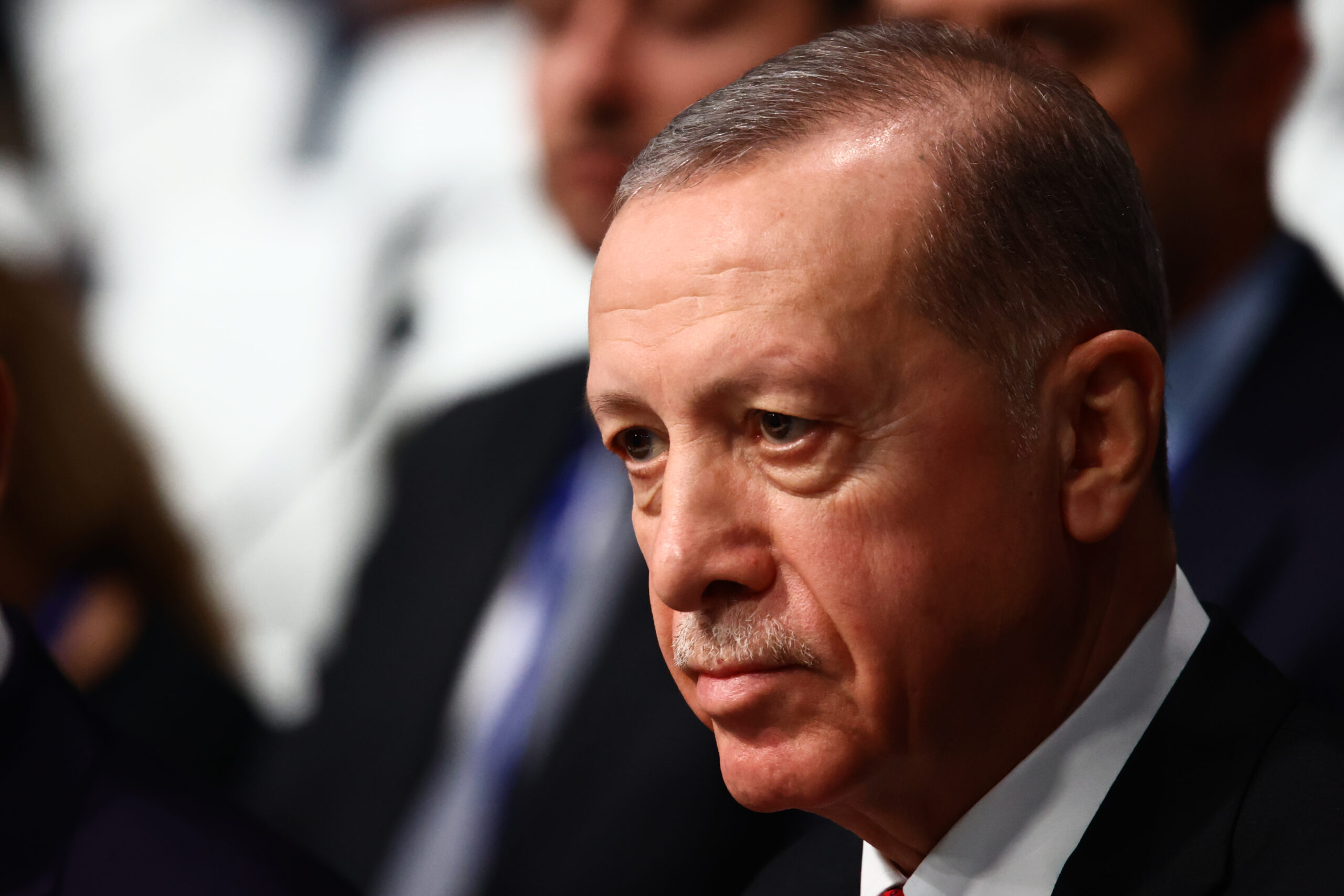The Western Hemisphere and American global power.
Israel in the Shadow of American Decline

Hamas is a less significant existential threat than the collapse of U.S. leadership.
And the word of the Lord came unto me the second time, saying, What seest thou? And I said, I see a seething pot; and the face thereof is toward the north.
Then the Lord said unto me, Out of the north an evil shall break forth upon all the inhabitants of the land. – Jeremiah 1:13-14
Strictly speaking, Israel’s Gaza war is not a tragedy, but rather a hideous accident. Many wars wait for years to happen until they can’t be stopped. Those are the tragedies. This one never should have happened. Israeli intelligence had the plans for the October 7 Hamas attack a year in advance, as well as urgent warnings from lower-echelon officers just before the event. But the top military and political leadership brushed them off.
This fits a venerable pattern. Stalin had the plans for Operation Barbarossa from his spy Victor Sorge; U.S. Naval Intelligence had warnings about the attack on Pearl Harbor; and the FBI had the jigsaw-puzzle pieces of 9/11, but failed to fit them together. Intelligence services are not rewarded for timely warnings, but for serving their masters’ political agendas, and Israel’s fabled spies turned out to be no different than their counterparts in other countries. Believing that $40 million a month in subsidies from Qatar and other economic concessions would keep Hamas quiet, the Israeli government refused to consider anything else.
There simply is no contest between 300,000 regular troops from the Israel Defense Forces and 30,000 to 40,000 lightly armed Hamas irregulars, any more than there was a contest between ISIS and the American army and its proxies. Whether Hamas is entirely or largely extirpated from Gaza depends on the extent to which Israel can resist American pressure to vitiate its operations. The outcome will not be much different in any case. Whatever happens, most of Gaza’s two million residents will spend the next couple of years in tent camps while the rest of the world dickers about what to do with them. Their living conditions will be similar to those of the more than 200,000 Jewish refugees who lived in tent cities for up to two years after they were expelled from Arab countries following the 1948 war.
For all the horrors of the October 7 attacks, they did not constitute an existential crisis for a country with the region’s most powerful military and an extraordinary capacity for national solidarity in the face of external threat.
The existential danger to Israel comes not from its southern border, but rather—as in Jeremiah 1:13-14—from the distant north, specifically Ukraine. The Biden Administration previously imagined that it could force regime change in Russia through crippling sanctions. Instead, a large part of world trade and financial currents skirted American sanctions, leaving Russia with barely-diminished oil revenues and a steady supply of high-tech components from China, directly and through such intermediaries as Turkey, Kazakhstan, Georgia, and Armenia. Rather than collapsing by 50 percent as President Biden predicted, Russia’s economy grew by 3 percent in 2023 after contracting by just 2.1 percent in 2022. Putin had an 80 percent approval rating as of October 2023. The Biden team is responsible for the grossest blunder in the checkered history of American foreign policy.
America’s strategic position is about to suffer a blow on par with, and perhaps more devastating than, the 1975 collapse of Vietnam. With a resident population of less than 30 million against Russia’s population of 147 million, Ukraine cannot put enough men in the field to hold the line against a Russian army with comparable technology and much greater firepower. The West can’t produce enough artillery shells, so Ukraine is firing hundreds of howitzer shells daily while Russia fires thousands. Both sides have lost 70,000 to 100,000 and three or four times that number wounded, but Russia has several times more people. None of the West’s Wunderwaffen have made a difference, and the Russians have some nasty weapons of their own, as well as clear air superiority.
Attempting to move NATO’s boundaries to the Russian-Ukraine border may have been the stupidest act in the sorry drama of American foreign policy, and President Biden’s declaration on March 26, 2022 that Putin cannot be allowed to remain in power may be the emptiest boast ever by an American leader. With few exceptions, the American foreign policy establishment has wagered its credibility on the outcome of this war. Although a few establishment stalwarts like Richard Haass talk of “redefining success in Ukraine,” i.e., declaring victory and going home, most of the Establishment has closed ranks. The professional penalties for doing otherwise are severe.
Making Enemies
The atmosphere in Washington resembles Vienna in the Spring of 1914 as depicted by Robert Musil in The Man Without Qualities (1930): The reader, but none of the protagonists, knows that their world of illusions is about to come to a horrible end. The American Establishment refuses to know this, but Russia knows it, as do China, the Gulf States, and everyone else. The change in the world balance of power after the collapse of Ukraine will be so dramatic that all the players in this global game are cautious about their next step. But Russia and China are probing American weaknesses in ways that remain well below the threshold of a casus belli, testing American responses.
Israel will suffer collateral damage. It needs American weapons, ammunition, and spare parts, especially with ammunition stockpiles depleted by the Ukraine war. It also depends on America’s veto at the U.N. Security Council. It does not help that the Biden Administration, with a view toward the pro-Palestinian sympathy of its progressive base, is doing whatever it can to hold Israel back from the military actions required to mop up Hamas. Although the American alliance is indispensable for Israel in the short term, the decline of American power will contribute to the strategic encirclement of Israel over time.
The late Henry Kissinger was asked on October 20, in his last published interview: “Is there the possibility for Russia to show greater involvement in the Middle East?” He answered: “Before the Ukrainian war, Russia was generally in favor of Israel in the confrontation with Arabs. If Russia now would intervene, it has two options: to engage on the side of the Arabs or to appear as a mediator in the crisis—which would be strange in light of the Ukrainian war.”
Since Russia intervened in the Syrian civil war in 2015 to prevent the Sunni jihad against the Assad government from creeping into the Russian Caucasus, Israel and Russia have maintained correct if not cordial relations in the Syrian theater. The Russians stood by while the Israeli Air Force flew thousands of sorties against Iranian-backed militias in Syria. That is critical for Israel’s security on its northern flank, where it faces a Hezbollah force three times as large as Hamas, armed with perhaps 150,000 missiles, including many modern models that may be able to evade Israeli defenses.
Now Russia’s turn toward Iran is cause for serious concern. At the end of November, Iran announced that it had “finalized” a deal to buy Russian SU-35 fighters from Russia, an airframe roughly comparable to the F-15s flown by the Israelis. It is not known whether the Russians will sell fully-loaded warplanes with advanced avionics and air-to-air missiles, or a less potent export version. Presumably, that is a matter for negotiation.
The Russians play chess while Americans play Monopoly, and the obvious Russian move in response to an American attempt to control the center of the board in Ukraine is to open a fianchetto with Iran.
If Washington chooses to demonize Russia, the likelihood is that Russia will become a spoiler with respect to American strategic interests in general, and use the Iranian problem to twist America’s tail. That is a serious risk indeed, for nuclear proliferation is the one means by which outlaw regimes can pose a serious threat to great powers. Russia confronts questions not of expediency, but of existence, and it will do whatever it can to gain maneuvering room should the West seek to “punish” it for its actions in Georgia.
One irony of the present crisis is that Washington’s neo-conservatives, by demanding a tough stance against Russia, may have harmed Israel’s security interests more profoundly than any of Israel’s detractors in American politics. The neo-conservatives are not as a rule Jewish, but many of them are Jews who have a deep concern for Israel’s security—as does this writer. If America turns Russia into a strategic adversary, the probability of Israel’s survival will drop by a big notch.
Putin’s state visit to Saudi Arabia and the United Arab Emirates, complete with military aircraft streaming the Russian colors, was “nothing less than Putin’s return to the world stage,” Germany’s Die Welt wrote Dec. 12. Later that week Putin received senior Iranian officials in Moscow.
Knives Out
Iran evidently decided to sit out the present Gaza conflict, rather than (as many feared) opening a second front against Israel in the north. But it is probing through its cat’s paw militias, testing Western responses. Hezbollah fired about 50 rockets at Israeli positions in November, compared to 4,000 rockets during the 2006 Lebanon war. The Houthi militia of Yemen has fired anti-ship missiles and drones at civilian ships, effectively diverting freight traffic out of the Red Sea. On December 18, the Pentagon announced a ten-country coalition (with the glaring absence of the Gulf States) to protect shipping.
In Asia, meanwhile, China’s navy Dec. 10 staged a minor standoff with Japanese vessels near the disputed Senkaku Islands. Chinese ships have harassed Philippine vessels with water cannons as they attempted to resupply Philippine forces in the South China Sea.
These are probes rather than preparations for war. The reading that China drew from Xi Jinping’s mid-November summit with President Biden is that America is frightened by the prospect of military engagement with China. The main American ask in San Francisco was the restoration of the hotline between the two militaries, which China suspended after then-House Speaker Nancy Pelosi’s visit to Taiwan. China also extracted an unambiguous statement from the White House that “we obviously don’t support independence for Taiwan.”
The U.S. Navy is outgunned within 1,000 miles or so of China’s coast. “The [People’s Liberation Army Air Force’s] ground-based missile forces complement the air and sea-based precision strike capabilities of the PLAAF and PLAN,” reported the Pentagon’s on November 29, 2022. “The PLARF continues to grow its inventory of DF-26 IRBMs, which are designed to rapidly swap conventional and nuclear warheads. They are also capable of precision land-attack and anti-ship strikes in the Western Pacific, the Indian Ocean, and the South China Sea from mainland China.” Like the Battleship Lobby of the 1930s, the Pentagon built the wrong kind of fleet: Too many aircraft carriers, now as vulnerable as battleships in 1940, and not enough submarines. To call attention to this fact is career suicide, which explains why the public debate focuses on cheap, quick fixes—more 155mm shells and HIMARS rockets for Taiwan, for example.
A Ukrainian defeat in the form of a significant loss of territory and a long-term ceasefire would remind the rest of the world of Kissinger’s quip that it is dangerous to be an enemy of the United States, but fatal to be our friend.
Israel will have to deal with a less cooperative Russia that dallies with Iran, a China that seeks to exploit anticolonial resentment in the Global South against Israel, a more assertive and better-armed Iran, and a vitiated American commitment to Western Asia. Its immediate problems are less dire than they appear: Except for Qatar and possibly some parts of the Turkish political spectrum, the rest of the world is happy to see Israel destroy Hamas. The Sunni jihad to which Hamas declares its allegiance is a persistent security problem for both Russia and China. Iran has armed and funded Hamas, but it does not want a Sunni entity to emerge as the main opposition to Israel. Israel’s long-term problems, though, are worse than they appear, and will come to the surface when the dust settles in Ukraine.
The event most likely to mitigate Israel’s strategic predicament would be the election of Donald Trump to a second term in 2024. Unlike the neoconservatives and global liberals presently in charge, Trump has no interest in regime change in Russia, and has no reason to perpetuate the blunders of others. He has pledged to end the war in Ukraine, which means cutting America’s losses. He is likely to maintain strong American support for Israel while limiting damage to America’s position abroad by conflict avoidance with Russia and China. Unlike the Biden foreign policy team, Trump has little interest in how other countries manage their affairs: his concern is the best deal for the United States.
The American Mind presents a range of perspectives. Views are writers’ own and do not necessarily represent those of The Claremont Institute.
The American Mind is a publication of the Claremont Institute, a non-profit 501(c)(3) organization, dedicated to restoring the principles of the American Founding to their rightful, preeminent authority in our national life. Interested in supporting our work? Gifts to the Claremont Institute are tax-deductible.
China and Russia may be using Iran and Hamas for a sinister grand design.
Israel, Hamas, and the fracturing of the American Left.
The attack on Israel and the demoralization of the West.




